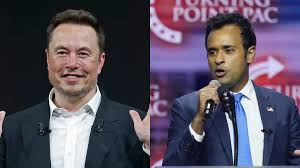BEIJING: US President-elect Donald Trump’s plan to overhaul the government with a new department headed by tech billionaire Elon Musk and Indian-origin entrepreneur Vivek Ramaswamy will be the biggest threat for China as it has to compete with far more efficient US political system, a policy advisor to the Chinese government said.
China’s biggest risk during Donald Trump’s 2.0 would be US government overhauls driven by Musk and Ramaswamy, according to Zheng Yongnian, China’s top academic and policy advisor to Beijing.
“A more efficient US political system would put huge pressure on China’s current system,” Zheng, dean of the School of Public Policy at the Chinese University of Hong Kong’s Shenzhen campus, said while speaking at Baichuan Forum hosted by the Institute for International Affairs (IIA) on Saturday.
“Of course, the pressure is not exclusive to China but also others, especially Europe,” he said. Trump named Musk and Ramaswamy to lead a new Department of Government Efficiency (DOGE).
The duo has already planned to scrap “thousands of regulations” and reduce the size of the government workforce.
Zhena said, “In the medium to long term, the greatest pressure on China may come from changes within the US.” If Trump succeeds in his efforts to overhaul the government, the US would “develop a new, more competitive system”, Zheng said, calling it a form of “state capitalism with American characteristics”.
“I think we should not underestimate the institutional reforms prioritised by figures like Musk,” he warned, the Hong Kong-based South China Morning Post reported on Sunday.
China is gearing up for Trump’s second term, beginning on January 20 next year, on several fronts, including his threat to impose a 60 per cent increase of tariffs on its over $427 billion annual exports to the US.
Trump, who acted tough on China during his previous term, is expected to reinforce measures against Beijing on various global fronts, including Taiwan and the South China Sea. China asserts Taiwan as part of its mainland and claims ownership over most of the South China Sea.


